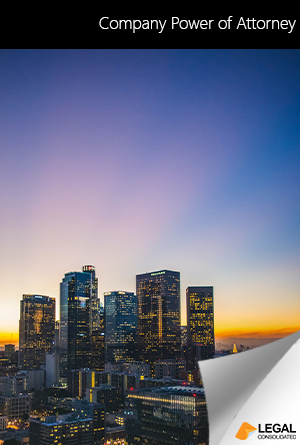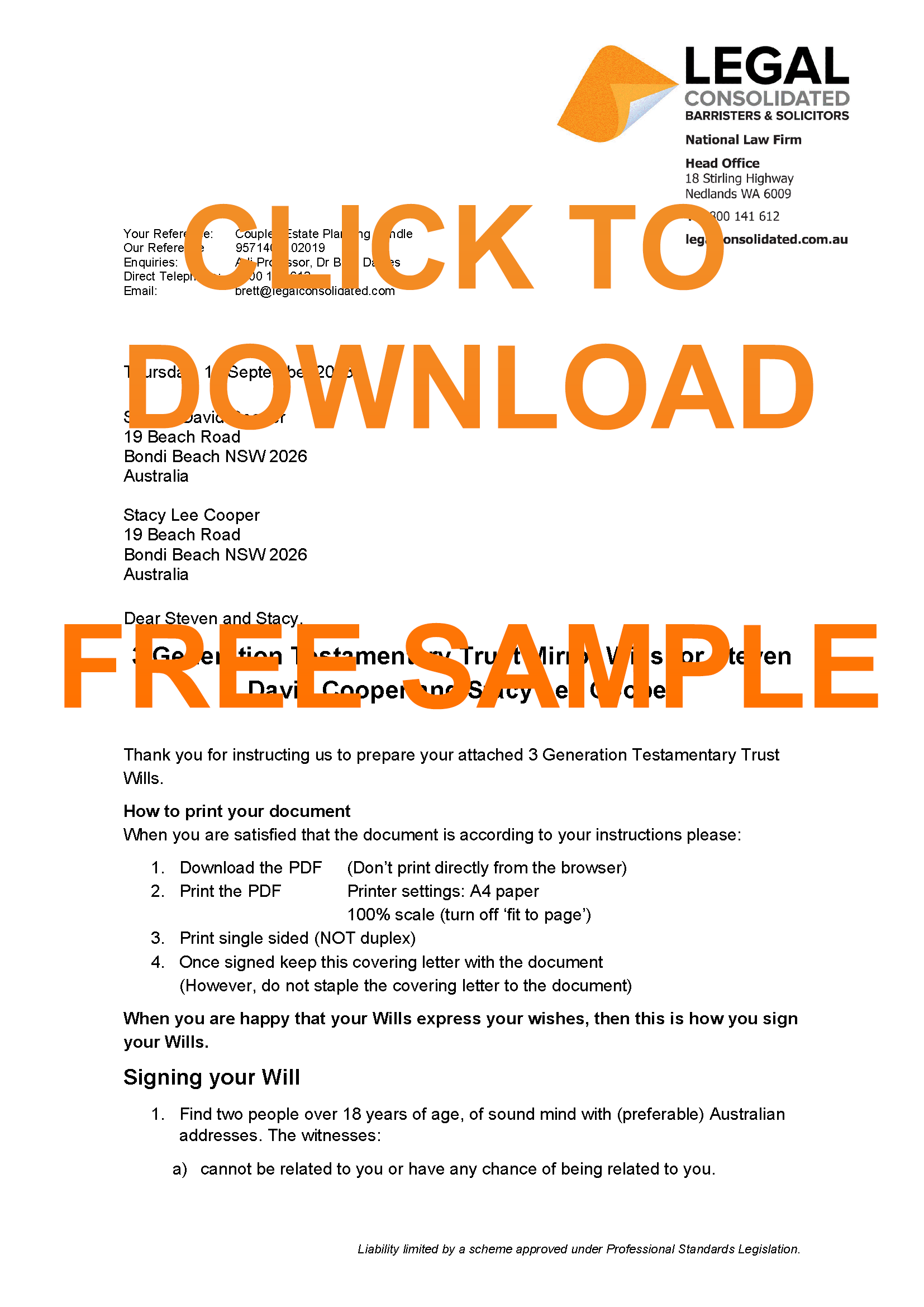
Company Power of Attorney
$380 includes GST
-
SMSF Corporate Trustee Power of Attorney
Where SMSF member is overseas, missing, dead or of unsound mind.
Fund Managers and SMSF require a corporate trustee POA
Fund managers and life insurance companies demand all directors of SMSF corporate trustees sign to release monies. This is especially if the assets are in a Self-Managed Super Fund.
In all states of Australia, humans can give ‘Enduring POAs‘ and ‘Medical/Lifestyle POAs‘. But Fund managers and life insurance companies accept neither. This is because a person holding an Enduring POA can not sign on behalf of a:
- director of a company; or
- the Company acting as trustee of the SMSF
An SMSF can have one to six members. All members must also be the directors of the SMSF Corporate Trustee. But if you have two or more directors, then the corporations law requires:
- two directors; or
- a director and a secretary
sign documents.
Let us say you have two directors. And one director loses capacity, dies or is unavailable. Then the SMSF corporate trustee company is unable to sign documents and enter into deeds. Appointing another person under an SMSF Corporate POAs is the remedy.
Can a Legal Consolidated corporate trustee power of attorney be used if the sole director/member dies?
Q: My client has an SMSF. It has a corporate trustee.
The corporate trustee has one director. This is, of course, the single-member.
If she dies does the Legal Consolidated SMSF Corporate Trustee POA continue on? Is this not a breach of the Superannuation laws?
A: The Legal Consolidated company POA continues on. This is after some or all the directors die. After all, this is one of its main purposes! So the answer is yes.
When the sole director/SMSF member dies the Legal Consolidated corporate POA continues on. It allows the people that the company appointed in the POA to continue to act in the company’s best interest. For example, this may be the aged person’s children.
Remember it is the SMSF Corporate Trustee that gives the POA. The directors have nothing to do with Company POAs. It is not the directors giving the Corporate POA. It is the company giving the POA. How many times do I have to repeat this?
Does this breach the Superannuation Laws? Well, that is a different question.
Under the Corporations Act your company gives a Corporate POA to a person. Most accountants and advisers recommend that the SMSF Trustee company signs a corporate POA. It is usual and best practice. Such SMSF Corporate POAs are common. They are not in breach of any Superannuation Law or SIS Regulations.
An SMSF with no members is a problem. It must be dealt with within a reasonable time. However, these issues do not relate to the validity of an SMSF Trustee POA. (Of course, an SMSF Trustee POA can help fix the problem.)
Secondly, any company that has no directors also needs to be rectified. This blemish needs to be fixed within a reasonable time. However, this, again, has nothing to do with the validity of the SMSF Corporate Trust giving a POA to a person. (When you have no directors, the shareholders call a general meeting and appoint a new director.)
Is it prudent for the SMSF corporate trustee to appoint the accountant’s practice to hold the Company POA?
The SMSF corporate trustee can only appoint a ‘human’ or a ‘company’. It cannot appoint a ‘trust‘, ‘firm’ or ‘partnership‘.
So:
- if your accounting house is a partnership then the SMSF corporate trustee could appoint one or two of the partners (but not the partnership itself); or
- if the accounting house is a company, then the SMSF corporate trustee could appoint the accounting house.
Should lawyers, accountants and financial planners hold human POAs and company POAs for their client?
Few accountants would want to take on the responsibility of holding a Company POA, of any nature. Few accountants would want to hold an enduring or lifestyle POA. Similarly, few accountants would want to hold a POA on behalf of a company. The job is too onerous. It is one of ‘utmost’ good faith.
Talk with your governing body, they probably will not allow it. Or caution you not to do it. Most financial planners dealer groups prohibit both ‘human’ and ‘company POAs’ being given to their financial planners.
If they are silent on the matter, then I am suggesting to you that you should not hold any type of POA for a client. It is too dangerous:
- Is acting either as an executor in a Will or as an attorney consistent with your professional practice?
- What is your insurance position?
- What body of ethical rules and guidelines apply?
A person holding a POA cannot sign on behalf of an SMSF corporate trustee
For example, John and Jenny are the two members of their Self-Managed Superannuation Fund. They have a special purpose company as trustee of their SMSF. This is called a corporate trustee.
Both John and Jenny are directors of their corporate trustee. The Superannuation laws require this.
Since the company has two directors for all deeds two people must sign. John and Jenny are required to sign all deeds together.
Sadly, John dies.
John has life insurance in his SMSF. Holding life insurance in your SMSF is often tax-effective and is common. (The 32% tax on life insurance at death is usually not applicable with a Superannuation Testamentary Trust in the Will.)
Jenny goes to the life insurance company. She asks for John’s life insurance to be paid out to the SMSF.
The life insurance is ready to hand over the money. “I just need you and John to sign the Deed of Release.”
“But John is dead”, Jenny laments “That is the reason why you are paying out the life insurance!”
“Sorry, we cannot help you. Speak with your financial planner and accountant”, barks back the 19-year-old person at the life insurance call centre.
But wait, Jenny holds an Enduring POA for John. However, as her adviser correctly states “a human POA cannot be used to sign on behalf of a director of a company”.
However, the adviser many years ago built a Company POA on Legal Consolidated’s website for the SMSF’s corporate trustee. The company authorises a human (or another company) to sign on behalf of the company.
The Company POA authorises Jenny to sign on behalf of the company. Jenny signs the life insurance Deed of Release, as the company’s POA and gets the life insurance.
I hope Jenny thanks the adviser who thought ahead.
SMSF Corporate Trustee POA vs Human POA
This is the difference between a Company POA and an Enduring POA:
- Company Power of Attorney – a company appoints an attorney (the attorney is another company or human) – the company (not a human) gives the company
- Enduring and Medical/lifestyle POAs – a human appoints an attorney (the attorney is only human) – a human gives the POA to another human
A company’s power of attorney is given by a company. The company appoints a human or another company to act and sign documents on the company’s behalf. A company power of attorney authorises a person or persons to act on behalf of a company. The attorney is allowed to sign documents on the company’s behalf.
The person the company appoints is called an “attorney”. Our company POA is flexible. The company appoints:
- a human
- humans
- another company
- other companies
- any combination of the above
(In contrast, a human POA (enduring or medical) only appoints another human or humans.)
Test to see if you know the difference between an SMSF company POA and an Enduring POA
-
Q: Can a human give an SMSF Company Trustee POA?
A: Of course not, only a company can give a Company POA.
-
Q: Can an SMSF Company POA appoint a human and a company?
A: That is correct. The person holding a company POA can be a human or a company. In fact, the company can appoint humans and companies. A Company can appoint a human or humans. A Company can appoint another company or companies. A Company through a Corporate POA can appoint numerous humans and companies.
-
Q: Can a person appoint an SMSF corporate trustee using an Enduring POA or Medical/Lifestyle POA?
A: This is a trick question. Firstly only a human can make an Enduring or Lifestyle POA. And that human can only appoint another human (or humans). There is no place for a company in an EPA or Medical/Lifestyle POA.
-
Q: It seems unfair that an Enduring POA is limited. And can not be used to sign on behalf of a director.
A: That is not a question. But you are correct. An Enduring POA has limits. The limits of a POA are set out here. The reason for this restriction is that a director of a company is obliged to give personal and careful thought to the operation of the company. The director cannot outsource that personal obligation. In contrast, the company can merely appoint a person through a Company POA to act for the company.
-
Q: Can a company give an Enduring or Lifestyle POA?
A: No. Only a human can make an Enduring POA. And they can only appoint humans.
-
Q: My company appoints two persons in the one Corporate POA. Must they act together? Must they act in concert? I want them to act severally.
A: They must act together. If you want them to act separately then merely build two separate Company POAs. For example, the company wants either Peter or Paul to sign documents for the company. The company builds a Company POA appointing just Peter. Later the company built a second Company POA, this time, appointing Paul. In contrast to a Company POA, in some states of Australia, an Enduring POA often allows you to appoint two attorneys who can act ‘together’ or ‘together and severally’.
-
Q: Can my company build more than one Company POA?
A: Yes, a company can give many Company POAs. This is to many different people. They can act severally. This means that one can do something. And then another attorney can do something different. So choose your trusted attorneys carefully.
The director goes walkabout? SMSF Company POA saves the day
The SMSF corporate POA provides continuity of company affairs and good stewardship. This is especially true if the directors are missing.
An SMSF company acts through its directors. (The Directors are also the Members of the SMSF.) Directors sign documents and make decisions for the company. What if the director is missing, sick or unable to act? The company loses its ability to act. Without a functioning director, a company is a ship without a rudder.
The company, itself, may appoint an attorney. This is via a company power of attorney. Under the corporate POA, the attorney has the power to do and sign things for the company. This includes signing documents and making company decisions.
See also: Central Management and Control of an SMSF
Corporate POA stops the SMSF company trustee from coming to a standstill
What if the director is unavailable? What if your director is going on holiday? What if your director loses mental capacity?
Company constitution silent on company power of attorney?
An Australian company has legal capacity. A company is a person. (Sure, an unnatural person, but a person nonetheless.) As such, under the Corporations Act, a company is allowed to appoint an attorney. It is not necessary to have a specific power in the Company Constitution.
Our Corporate POA is drafted so that it does not matter if the company constitution is silent on delegated authority.
The attorney can be a human or even another company.
Just use a ‘human’ Enduring POA from one of the directors?
There are company POAs. And there are human POAs (enduring and lifestyle/medical). Each State and Territory has its own set of documents for human POAs.
An individual power of attorney gives your attorney legal authority to manage your assets and financial affairs when the individual is unable to do so. This is for illness, accident and absence. A company power of attorney authorises a person or persons to act on behalf of a company and or sign certain documents on its behalf.
A ‘human’ POA does not work. No, a key reason why company powers of attorneys are so important is that an individual power of attorney is not a substitute for a company power of attorney. Even if you have granted a power of attorney to someone to manage your financial affairs, this does not extend to your company and the attorney cannot sign documents on your behalf in your capacity as director of a company.
A company power of attorney is granted to a person or persons. The company power of attorney is unique to the company.
There are hints as you build your document. For more legal advice telephone us. We are a law firm. We can help you answer the questions.
Business Structures vs Self Managed Superannuation Funds
Family trust v an SMSF
- Family Trust Deed – watch the free training course
- Family Trust Updates:
- Everything – Appointor, Trustee & Deed Update
- Deed ONLY – only update the Deed for tax
- Guardian and Appointor – only update the Guardian & Appointor
- Change the Trustee – change human Trustees and Company Trustees
- The company as Trustee of Family Trust – only for assets protection?
- Bucket Company for Family Trust – tax advantages of a corporate beneficiary
Unit trust vs an SMSF
- Unit Trust
- Unit Trust Vesting Deed – wind up your Unit Trust
- Change Unit Trust Trustee – replace the trustee of your Unit Trust
- Company as Trustee of Unit Trust – how to build a company designed to be a trustee of a Unit Trust
Corporate structures vs an SMSF
- Partnership Agreement – but what about joint liability?
- Incorporate an Australian Company – best practice with the Constitution
- Upgrade the old Company Constitution – this is why
- Replace lost Company Constitution – about to get an ATO Audit?
- Independent Contractor Agreement – make sure the person is NOT an employee
- Service Trust Agreement – operate a second business to move income and wealth
- Law firm Service Trust Agreement – how a law firm runs the backend of its practice
- Medical Doctor Service Trust Agreement – complies with all State rules, including New South Wales
- Dentist Service Trust Agreement – how dentists move income to their family
- Engineering Service Trust Agreement – commonly engineers set up the wrong structure
- Accountants Service Trust Agreement – complies with ATO’s new view on the Phillips case

